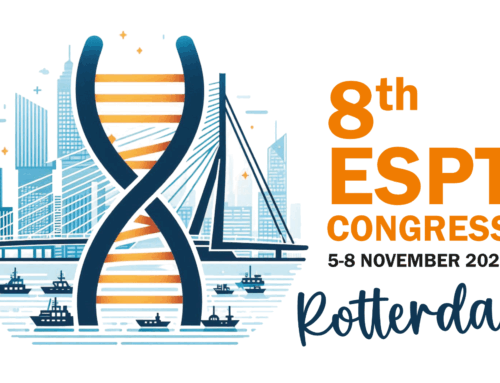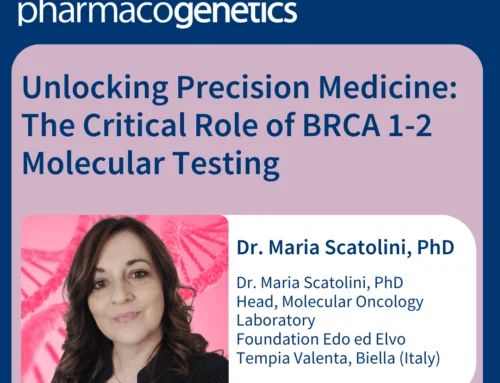DPYD Genotyping in Fluoropyrimidine Therapy: Reducing Toxicity, Improving Outcome
Fluoropyrimidines such as 5-fluorouracil (5-FU), capecitabine, and tegafur are widely used in oncology, treating over 3.5 million patients annually—with 600,000 in Europe alone. Despite their effectiveness, these drugs carry a significant risk of toxicity: 10–40% of patients develop severe side effects (Grade 3–4) requiring hospitalisation and occasionally intensive care admission. From 0.2% to 0.8% die from treatment-related complications.
Up to 50% of these toxicities are linked to deficiency of dihydropyrimidine dehydrogenase (DPD), the key enzyme responsible for 80% of fluoropyrimidine metabolism. When DPD activity is reduced, drug accumulation can lead to life-threatening adverse effects. The primary cause of DPD deficiency is inherited variants in the DPYD gene. Four well-characterized variants—DPYD*2A, c.2846A>T, DPYD*13, and the HapB3 haplotype—, over the 1600 identified, are widely recognized for their established associations with fluoropyrimidine-induced toxicity. Individuals carrying these variants are classified as intermediate or poor metabolizers, depending on the number and type of mutations.
Two large prospective trials—PREPARE and PACIFIC-PGx—have shown that pre-treatment DPYD genotyping followed by dose adjustment reduces both the frequency and severity of toxicities without compromising treatment efficacy.
Two large prospective multicentre studies have shown that pre-emptive DPYD genotyping identifies patients at risk of severe fluoropyrimidine toxicity, and that dose adjustment reduces both the frequency and severity of adverse effects without compromising efficacy. [6-10] These results were recently confirmed by the prospective, multi-site PACIFIC-PGx clinical trial and by the single-country secondary analysis stemming from the international, prospective, multi-centre PREPARE clinical trial.
Based upon the expanded evidence from published literature and clinical trials supporting the association between some DPYD variants and fluoropyrimidine toxicity, leading pharmacogenetics experts have developed a series of guidelines and recommendations.
In 2013, Clinical Pharmacogenetics Implementation Consortium (CPIC) issued its first guideline regarding fluoropyrimidines treatment and DPYD testing. These recommendations were later updated four times, between 2014 and 2024.
Similarly, the Dutch Pharmacogenetics Working Group (DPWG) recommended pre-emptive DPYD genotyping with genotype-guided dosing strategies or avoidance of fluoropyrimidines in patients carrying certain high-risk DPYD variants.
In 2024, the Pharmacogenomics Working Group of the Clinical Practice Committee, Association for Molecular Pathology (AMP) has provided a guideline that recommends a minimum set and an extended list of DPYD variant alleles to be analysed.
Since April 2020 The European Medicines Agency (EMA) has recommended, that all patients starting fluoropyrimidines undergo testing for DPD deficiency. Patients with complete deficiency should avoid these drugs entirely, while intermediate metabolizers should start at a reduced dose.
In the United States, on March 2024 the FDA updated its labels for 5-FU and capecitabine, advising clinicians to “consider DPYD testing prior to treatment” and to “inform patients of the potential for severe reactions due to DPD deficiency”.
Most recently, the NCCN guidelines (March 2025) for colorectal and related cancers recommend discussing DPYD genotyping with all patients before starting fluoropyrimidine-based therapies.
A guidance for DPYD and fluoropyrimidines was provided also by regulatory agencies of United States, Canada European Union, UK, Switzerland and Japan.
In conclusion, DPYD genotyping is a clinically validated, cost-effective tool that reduces preventable toxicity, improves patient safety, and optimizes cancer therapy. With broad support from regulators, clinicians, and health economists alike, its implementation represents a concrete step toward safer, more precise oncology.
References
- Ho TT, Smith DM, Aquilante CL et al; Pharmacogenomics Global Research Network Publication Committee. A Guide for Implementing DPYD Genotyping for Systemic Fluoropyrimidines into Clinical Practice. Clin Pharmacol Ther. 2025 May;117(5):1194-1208.
- White C, Paul C, Liet E et al. Implementing DPYD genotyping to predict chemotherapy toxicity in Australia: a feasibility study. Intern Med J. 2025 Apr 11.
- Chan TH, Zhang JE, Pirmohamed M. DPYD genetic polymorphisms in non-European patients with severe fluoropyrimidine-related toxicity: a systematic review. Br J Cancer. 2024 Aug;131(3):498-514.
- Keen J, McDermott JH, Aguilar-Martinez E, Newman WG. Pharmacogenomics: DPYD and Prevention of Toxicity. Clin Oncol (R Coll Radiol). 2025 Feb;38:103706.
- NCCN Colon Cancer Guidelines Version 2.2025. March 31, 2025.
- Deenen MJ, Meulendijks D, Cats A, Sechterberger MK, Severens JL, Boot H, Smits PH, Rosing H, Mandigers CM, Soesan M, Beijnen JH, Schellens JH. Upfront Genotyping of DPYD*2A to Individualize Fluoropyrimidine Therapy: A Safety and Cost Analysis. J Clin Oncol. 2016 Jan 20;34(3):227-34.
- Henricks LM, van Merendonk LN, Meulendijks D, Deenen MJ, Beijnen JH, de Boer A, Cats A, Schellens JHM. Effectiveness and safety of reduced-dose fluoropyrimidine therapy in patients carrying the DPYD*2A variant: A matched pair analysis. Int J Cancer. 2019 May 1;144(9):2347-2354.
- Henricks LM, Lunenburg CATC, de Man FM, Meulendijks D, Frederix GWJ, Kienhuis E, Creemers GJ, Baars A, Dezentjé VO, Imholz ALT, Jeurissen FJF, Portielje JEA, Jansen RLH, Hamberg P, Ten Tije AJ, Droogendijk HJ, Koopman M, Nieboer P, van de Poel MHW, Mandigers CMPW, Rosing H, Beijnen JH, Werkhoven EV, van Kuilenburg ABP, van Schaik RHN, Mathijssen RHJ, Swen JJ, Gelderblom H, Cats A, Guchelaar HJ, Schellens JHM. DPYD genotype-guided dose individualisation of fluoropyrimidine therapy in patients with cancer: a prospective safety analysis. Lancet Oncol. 2018 Nov;19(11):1459-1467.
- Henricks LM, Lunenburg CATC, de Man FM, Meulendijks D, Frederix GWJ, Kienhuis E, Creemers GJ, Baars A, Dezentjé VO, Imholz ALT, Jeurissen FJF, Portielje JEA, Jansen RLH, Hamberg P, Ten Tije AJ, Droogendijk HJ, Koopman M, Nieboer P, van de Poel MHW, Mandigers CMPW, Rosing H, Beijnen JH, van Werkhoven E, van Kuilenburg ABP, van Schaik RHN, Mathijssen RHJ, Swen JJ, Gelderblom H, Cats A, Guchelaar HJ, Schellens JHM. A cost analysis of upfront DPYD genotype-guided dose individualisation in fluoropyrimidine-based anticancer therapy. Eur J Cancer. 2019 Jan;107:60-67.
- Knikman JE, Wilting TA, Lopez-Yurda M, Henricks LM, Lunenburg CATC, de Man FM, Meulendijks D, Nieboer P, Droogendijk HJ, Creemers GJ, Mandigers CMPW, Imholz ALT, Mathijssen RHJ, Portielje JEA, Valkenburg-van Iersel L, Vulink A, van der Poel MHW, Baars A, Swen JJ, Gelderblom H, Schellens JHM, Beijnen JH, Guchelaar HJ, Cats A. Survival of Patients With Cancer With DPYDVariant Alleles and Dose-Individualized Fluoropyrimidine Therapy-A Matched-Pair Analysis. J Clin Oncol. 2023 Dec 10;41(35):5411-5421.
- Glewis S, Lingaratnam S, Lee B, Campbell I, IJzerman M, Fagery M, Harris S, Georgiou C, Underhill C, Warren M, Campbell R, Jayawardana M, Silva SSM, Martin JH, Tie J, Alexander M, Michael M. Pharmacogenetic-guided dosing for fluoropyrimidine (DPYD) and irinotecan (UGT1A1*28) chemotherapies for patients with cancer (PACIFIC-PGx): A multicenter clinical trial. Clin Transl Sci. 2024 Dec;17(12):e70083.
- Roncato R, Bignucolo A, Peruzzi E, Montico M, De Mattia E, Foltran L, Guardascione M, D’Andrea M, Favaretto A, Puglisi F, Swen JJ, Guchelaar HJ, Toffoli G, Cecchin E. Clinical Benefits and Utility of Pretherapeutic DPYD and UGT1A1 Testing in Gastrointestinal Cancer: A Secondary Analysis of the PREPARE Randomized Clinical Trial. JAMA Netw Open. 2024 Dec 2;7(12):e2449441.
- Caudle KE, Thorn CF, Klein TE, Swen JJ, McLeod HL, Diasio RB, Schwab M. Clinical Pharmacogenetics Implementation Consortium guidelines for dihydropyrimidine dehydrogenase genotype and fluoropyrimidine dosing. Clin Pharmacol Ther. 2013 Dec;94(6):640-5.
- Amstutz U, Henricks LM, Offer SM, Barbarino J, Schellens JHM, Swen JJ, Klein TE, McLeod HL, Caudle KE, Diasio RB, Schwab M. Clinical Pharmacogenetics Implementation Consortium (CPIC) Guideline for Dihydropyrimidine Dehydrogenase Genotype and Fluoropyrimidine Dosing: 2017 Update. Clin Pharmacol Ther. 2018 Feb;103(2):210-216.
- CPIC® Guideline for Fluoropyrimidines and DPYD. Accessed April 24, 2025. https://cpicpgx.org/guidelines/guideline-for-fluoropyrimidines-and-dpyd/.
- Swen JJ, Nijenhuis M, de Boer A, Grandia L, Maitland-van der Zee AH, Mulder H, Rongen GA, van Schaik RH, Schalekamp T, Touw DJ, van der Weide J, Wilffert B, Deneer VH, Guchelaar HJ. Pharmacogenetics: from bench to byte–an update of guidelines. Clin Pharmacol Ther. 2011 May;89(5):662-73.
- Annotation of DPWG Guideline for fluorouracil and DPYD. Accessed April 24, 2025. https://www.pharmgkb.org/guidelineAnnotation/PA166104939
- Lunenburg CATC, van der Wouden CH, Nijenhuis M, Crommentuijn-van Rhenen MH, de Boer-Veger NJ, Buunk AM, Houwink EJF, Mulder H, Rongen GA, van Schaik RHN, van der Weide J, Wilffert B, Deneer VHM, Swen JJ, Guchelaar HJ. Dutch Pharmacogenetics Working Group (DPWG) guideline for the gene-drug interaction of DPYD and fluoropyrimidines. Eur J Hum Genet. 2020 Apr;28(4):508-517.
- Pratt VM, Cavallari LH, Fulmer ML, Gaedigk A, Hachad H, Ji Y, Kalman LV, Ly RC, Moyer AM, Scott SA, Turner AJ, van Schaik RHN, Whirl-Carrillo M, Weck KE. DPYD Genotyping Recommendations: A Joint Consensus Recommendation of the Association for Molecular Pathology, American College of Medical Genetics and Genomics, Clinical Pharmacogenetics Implementation Consortium, College of American Pathologists, Dutch Pharmacogenetics Working Group of the Royal Dutch Pharmacists Association, European Society for Pharmacogenomics and Personalized Therapy, Pharmacogenomics Knowledgebase, and Pharmacogene Variation Consortium. J Mol Diagn. 2024 Oct;26(10):851-863.
- National Comprehensive Cancer Network. NCCN Clinical Practice Guidelines in Oncology: Colon Cancer. Version 2.2025. March 31, 2025. Accessed April 24, 2025. https://www.nccn.org/guidelines/
- National Comprehensive Cancer Network. NCCN Clinical Practice Guidelines in Oncology: Rectal Cancer. Version 2.2025. March 31, 2025. Accessed April 24, 2025. https://www.nccn.org/guidelines/
- National Comprehensive Cancer Network. NCCN Clinical Practice Guidelines in Oncology: Anal Cancer. Version 3.2025. March 31, 2025. Accessed April 24, 2025. https://www.nccn.org/guidelines/
- National Comprehensive Cancer Network. NCCN Clinical Practice Guidelines in Oncology: Small Bowel Adenocarcinoma. Version 3.2025. March 31, 2025. Accessed April 24, 2025. https://www.nccn.org/guidelines/
- Medicines and Healthcare products Regulatory Agency. 5-fluorouracil (intravenous), capecitabine, tegafur: DPD testing recommended before initiation to identify patients at increased risk of severe and fatal toxicity. Accessed April 24, 2025. https://www.gov.uk/drug-safety-update/5-fluorouracil-intravenous-capecitabine-tegafur-dpd-testing-recommended-before-initiation-to-identify-patients-at-increased-risk-of-severe-and-fatal-toxicity
- Food and Drug Administration – Drugs@FDA: FDA-Approved Drugs. Fluorouracil and capecitabine labels. Accessed April 24, 2025. https://www.accessdata.fda.gov/
- European Medicines Agency. EMA recommendations on DPD testing prior to treatment with fluorouracil, capecitabine, tegafur and flucytosine. 24 April 2020.
Irinotecan and UGT1A1: How Genetic Testing Can Improve Chemotherapy Safety and Efficacy
Since its clinical introduction in 1998, irinotecan has become a cornerstone in the treatment of solid tumors. Each year, approximately 33,000 patients with colorectal carcinoma in the United States receive this drug.
Despite its therapeutic benefits, irinotecan is associated with significant toxicities. Nearly 40% of patients experience severe delayed diarrhea and up to 50% develop grade ?3 neutropenia, often requiring hospitalization. These adverse effects are primarily due to the accumulation of SN-38, the active metabolite of irinotecan, which inhibits topoisomerase-I, an enzyme critical for DNA replication. Under normal circumstances, SN-38 is inactivated through glucuronidation by the enzyme UGT1A1, allowing its elimination via bile.
However, genetic variations in the UGT1A1 gene can impair this detoxification process, leading to higher systemic exposure to SN-38 and increasing the risk of toxicity. The most significant polymorphisms are UGT1A1*28 and UGT1A1*6. The *28 allele, more common in Caucasians and Africans, results in reduced gene expression due to an extra TA repeat in the promoter region. Meanwhile, *6, more prevalent in Asian populations, corresponds to the nucleotide substitution c.211G>A, that also reduces enzyme activity.
Individuals carrying homozygous variants of either allele (*28/*28 or *6/*6) are classified as poor metabolizers (PM) and are at significantly higher risk for irinotecan-related toxicities whereas Heterozygous carriers of UGT1A1*28 or UGT1A1*6 are considered intermediate metabolizers (IM). Genetic testing for UGT1A1 polymorphisms has become a crucial tool in personalized medicine to reduce adverse effects and optimize dosing.
Numerous studies and meta-analyses have confirmed that genotype-guided dosing of irinotecan can help prevent severe toxicities without compromising treatment efficacy. For example, clinical simulations have demonstrated that reducing the irinotecan dose by 25% in patients with the *28/*28 genotype can reduce the incidence of severe neutropenia from 45% to 18% and severe diarrhea from 19% to 9%. A prospective multicenter study further validated these findings, showing that 30% dose reduction in poor metabolizers decreased the incidence of febrile neutropenia from 24% to 6.5% while maintaining the drug’s therapeutic effectiveness.
In addition to clinical safety, UGT1A1 testing also offers substantial economic benefits. A study conducted within the PREPARE trial (with 563 patients) revealed that genetic-guided dosing led to lower toxicity rates and reduce costs due to fewer hospitalizations and interventions.
While genetic testing for UGT1A1 polymorphisms is increasingly recommended in clinical guidelines, there are still variations in the specific recommendations across different agencies. The Dutch Pharmacogenetics Working Group (DPWG), for example, recommends pre-treatment UGT1A1 genotyping for all patients who will receive irinotecan. In cases where patients are identified as poor metabolizers, they should start with 70% of the standard irinotecan dose, followed by careful titration. Similarly, the French National Network of Pharmacogenetics (RNPGx) supports pre-treatment testing and suggests a 25–30% dose reduction in homozygous *28/*28 patients, particularly when irinotecan doses exceed 180 mg/m².
Both the FDA and EMA recognize the increased risk of toxicity in patients with the *28/*28 genotype but only the irinotecan product labels provide specific guidance on lowering the initial dose in these patients.
The integration of UGT1A1 genetic testing in chemotherapy protocols for irinotecan is an essential advancement in personalized cancer treatment. By identifying patients at higher risk of severe toxicity, clinicians can adjust dosing strategies to optimize treatment outcomes while minimizing adverse events.
References
- Roncato R, Bignucolo A, Peruzzi E, Montico M, De Mattia E, Foltran L, Guardascione M, D’Andrea M, Favaretto A, Puglisi F, Swen JJ, Guchelaar HJ, Toffoli G, Cecchin E. Clinical Benefits and Utility of Pretherapeutic DPYD and UGT1A1 Testing in Gastrointestinal Cancer: A Secondary Analysis of the PREPARE Randomized Clinical Trial. JAMA Netw Open. 2024 Dec 2;7(12):e2449441.
- de Man FM, Goey AKL, van Schaik RHN, Mathijssen RHJ, Bins S. Individualization of Irinotecan Treatment: A Review of Pharmacokinetics, Pharmacodynamics, and Pharmacogenetics. Clin Pharmacokinet. 2018 Oct;57(10):1229-1254.
- Karas S, Innocenti F. All You Need to Know About UGT1A1 Genetic Testing for Patients Treated With Irinotecan: A Practitioner-Friendly Guide. JCO Oncol Pract. 2022 Apr;18(4):270-277.
- Hulshof EC, Deenen MJ, Nijenhuis M, Soree B, de Boer-Veger NJ, Buunk AM, Houwink EJF, Risselada A, Rongen GAPJM, van Schaik RHN, Touw DJ, van der Weide J, van Westrhenen R, Deneer VHM, Guchelaar HJ, Swen JJ. Dutch pharmacogenetics working group (DPWG) guideline for the gene-drug interaction between UGT1A1 and irinotecan. Eur J Hum Genet. 2023 Sep;31(9):982-987. doi: 10.1038/s41431-022-01243-2. Epub 2022 Nov 28. Erratum in: Eur J Hum Genet. 2023 Sep;31(9):1088-1089.
- Butzke B, Oduncu FS, Severin F, Pfeufer A, Heinemann V, Giessen-Jung C, Stollenwerk B, Rogowski WH. The cost-effectiveness of UGT1A1 genotyping before colorectal cancer treatment with irinotecan from the perspective of the German statutory health insurance. Acta Oncol. 2016;55(3):318-28.
- Hulshof EC, de With M, de Man FM, Creemers GJ, Deiman BALM, Swen JJ, Houterman S, Koolen SLW, Bins S, Thijs AMJ, Laven MMJ, Hövels AM, Luelmo SAC, Houtsma D, Shulman K, McLeod HL, van Schaik RHN, Guchelaar HJ, Mathijssen RHJ, Gelderblom H, Deenen MJ. UGT1A1 genotype-guided dosing of irinotecan: A prospective safety and cost analysis in poor metaboliser patients. Eur J Cancer. 2022 Feb;162:148-157.
- Quaranta S, Thomas F. Pharmacogenetics of anti-cancer drugs: State of the art and implementation – recommendations of the French National Network of Pharmacogenetics. Therapie. 2017 Apr;72(2):205-215.
- Food and Drug Administration – Drugs@FDA: FDA-Approved Drugs. Camptosar, Onivyde and Trodelvy labels. Accessed April 24, 2025. https://www.accessdata.fda.gov/
- European Medicines Agency. Onivyde pegylated liposomal and Trodelvy Product information. https://www.ema.europa.eu/en/medicines/human/EPAR/onivyde-pegylated-liposomal
https://www.ema.europa.eu/en/medicines/human/EPAR/trodelvy#product-info
Accessed April 24, 2025.





